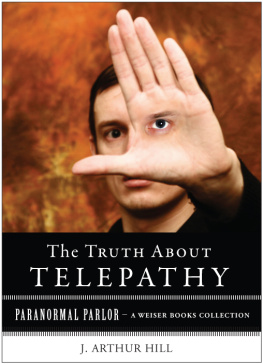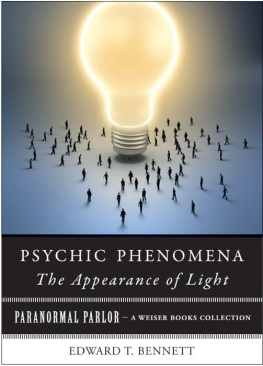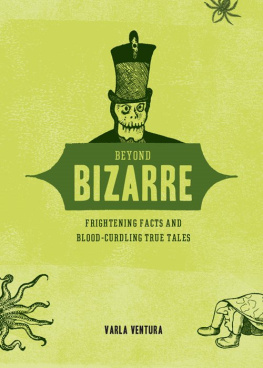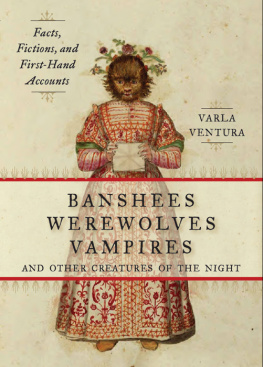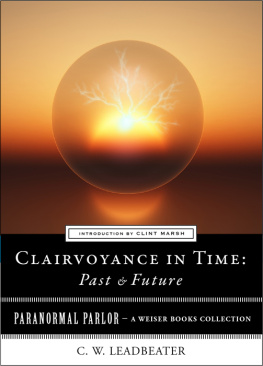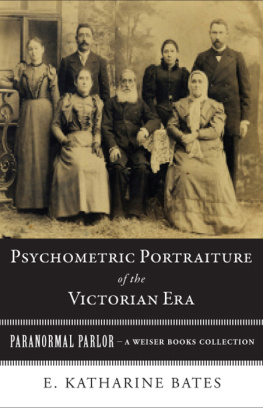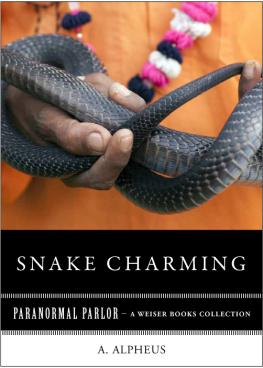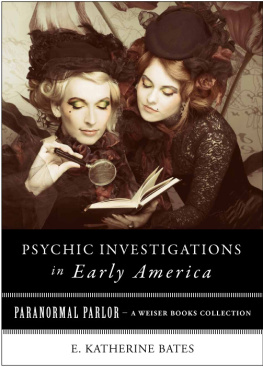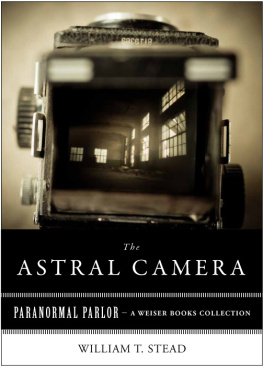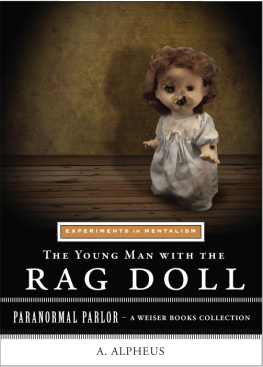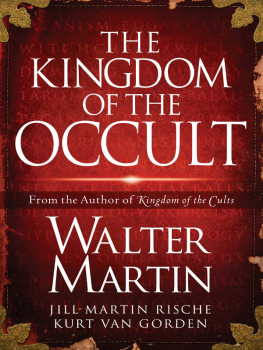J. Arthur Hill - The Truth About Telepathy
Here you can read online J. Arthur Hill - The Truth About Telepathy full text of the book (entire story) in english for free. Download pdf and epub, get meaning, cover and reviews about this ebook. year: 2012, publisher: Red Wheel Weiser, genre: Detective and thriller. Description of the work, (preface) as well as reviews are available. Best literature library LitArk.com created for fans of good reading and offers a wide selection of genres:
Romance novel
Science fiction
Adventure
Detective
Science
History
Home and family
Prose
Art
Politics
Computer
Non-fiction
Religion
Business
Children
Humor
Choose a favorite category and find really read worthwhile books. Enjoy immersion in the world of imagination, feel the emotions of the characters or learn something new for yourself, make an fascinating discovery.
- Book:The Truth About Telepathy
- Author:
- Publisher:Red Wheel Weiser
- Genre:
- Year:2012
- Rating:5 / 5
- Favourites:Add to favourites
- Your mark:
- 100
- 1
- 2
- 3
- 4
- 5
The Truth About Telepathy: summary, description and annotation
We offer to read an annotation, description, summary or preface (depends on what the author of the book "The Truth About Telepathy" wrote himself). If you haven't found the necessary information about the book — write in the comments, we will try to find it.
Varla Ventura, Coast to Coast favorite, Weird News blogger on Huffington Post, and author of The Book of the Bizarre and Beyond Bizarre, introduces Weiser Books new Collection of forgotten occult classics. Paranormal Parlor is an eerie assemblage of affordable digital editions, curated with Varlas sixth sense for tales of the weird and unusual.
One of the leading investigators and psychic sleuths of the Roaring 20s takes a high-society approach to the truth behind occult powers and mentalism.
The Truth About Telepathy — read online for free the complete book (whole text) full work
Below is the text of the book, divided by pages. System saving the place of the last page read, allows you to conveniently read the book "The Truth About Telepathy" online for free, without having to search again every time where you left off. Put a bookmark, and you can go to the page where you finished reading at any time.
Font size:
Interval:
Bookmark:
This ebook edition first published in 2012 by Red Wheel/Weiser, LLC.
With offices at:
665 Third Street, Suite 400
San Francisco, CA 94107
www.redwheelweiser.com
Copyright 2012 by Red Wheel/Weiser LLC. All rights reserved.
Excerpted from Psychical Miscellanea by J. Arthur Hill. New York: Harcourt, Brace & Howe, 1920.
eISBN: 978-1-61940-068-9
Cover design by Jim Warner
I was five years old the first time I saw an apparition. I was half-asleep, the pre-dawn crickets had gone silent, and I was stirred into waking by a gentle pulling on my toe. When I opened my eyes, I saw my paternal grandfather standing at the foot of my bed. He smiled. I slid my toes out of the covers into my slippers, preparing to lean into a nice big hug, but he was gone. I thought it strange, but to a five-year-old the very regular world can seem like a strange place, so I drifted back to sleep. The next morning when I told my mom about my nighttime vision, she burst into tears. My grandpa had died just after midnight, perhaps an hour before he visited me.
As I grew up and started collecting strange stories of the supernatural variety, I found that this kind of manifestation is actually fairly common. An after-death farewell. Yet the idea of visitors from the great beyond is a subject that few dare to discuss in open company (unless you are hanging out with me) lest their experiences be ridiculed or their ideas sound crazy.
In this excerpt from J. Arthur Hill's greater work Psychical Miscellanea, we find another example of early American investigation of paranormal phenomena. He explores the meaning behind telepathy and attempts to set the record straight on a number of issues relating to the supernatural and supernormal, addressed of course to his 1920s audience. Hill, the author of Psychical Investigations, Man Is a Spirit, Spiritualism: Its History, Phenomena, and Doctrine, among others, takes a dogged but decidedly journalistic approach to the proof from the Other World and Other Powers. Of particular note is the way in which he gives credence to the testimony by providing the high-society backgrounds of any participants. These are successful businessmen and other upstanding members of society. He claims to do this to give weight to the validity of his claims because some critics seem to have a notion that psychical researchers are a crowd of long-haired poets or semi-lunatic cranks.
Though he doesn't always make it clear, one gets the impression that this upstanding citizen has had his own fair share of psychic experiences. Perhaps that is the driving force behind his investigations. I know it is mine.
IN PSYCHIC SOLIDARITY,
VARLA VENTURA
SAN FRANCISCO, 2012
It is found by experiment that ideas can be communicated from mind to mind through channels other than the known sensory ones. Professor Gilbert Murray of Oxford, probably the most famous Greek scholar in this country, recently carried out some interesting experiments of this kind in his own family. He would go into another room, leaving his wife and daughter to decide on something which they would try to communicate to him on his return. They chose the most absurd and unlikely things, but in a large number of cases Professor Murray, by making his mind as passive as possible and saying the first thing that came into his head, was able to reproduce with startling accuracy the idea they had in mind. For instance, they thought of Savonarola at Florence and the people burning their clothes and pictures and valuables. Says Professor Murray: I first felt This is Italy, then, this is not modern; and then hesitated, when accidentally a small tarry bit of coal tumbled out of the fire. I smelt oil or paint burning and so got the whole scene. It seems as though here some subconscious impression, struggling up towards consciousness, caught hold of the burning coal as a means of getting through. On another occasion they thought of Grandfather at the Harrow and Winchester cricket match, dropping hot cigar-ash on Miss Thompson's parasol. Professor Murray's guess, reported verbatim, was: Why, this is grandfather! He's at a cricket matchwhy it's absurd: he seems to be dropping ashes on a lady's parasol. Another time they thought of a scene in a book of Strindberg's which Professor Murray had not read: a poor, old, cross, disappointed schoolmaster eating crabs for lunch at a restaurant, and insisting on having female crabs. Professor Murray says: I got the atmosphere, the man, the lunch in the restaurant on crabs, and thought I had finished, when my daughter asked: What kind of crabs? I felt rather impatient and said: Oh, Lord, I don't know: female crabs. That is, the response to the question came automatically, with no preparation, while I thought I could not give it. I may add that I had never before heard of there being any inequality between the sexes among crabs, regarded as food.
This kind of evidence is not the best, because the thoughts of members of one family run more or less in similar grooves; though the experimenters recognised this and chose unlikely things purposely. Other investigators have sometimes used cards, drawing one at random from a shuffled pack, looking at it, and the percipient then trying to say what it is. The chance of success is of course one in fifty-two, and the amount of success which we might expect by chance in any series can be mathematically determined. In one series of successful experiments conducted by Sir Oliver Lodge the odds against an explanation by chance alone were about ten millions to one. In ordinary matters this would be regarded as proof.
Other experiments of the same general character have been carried out by Sir William Barrett, Professor Sidgwick, and others, and details may be found in the S.P.R. Proceedings. In most cases the idea comes into the mind as an impression, but if the percipient is a good visualiser it is sometimes seen almost externalised as a hallucination. This leads us to the next step.
If it is possible to convey to another mindsometimes so vividly that the thing is almost seen as if out there in spacean image of scenes thought about, may it not be possible to convey an image of oneself? This idea occurred to a gentleman referred to by Myers as Mr S. H. B. in his book Human Personality and Its Survival of Bodily Death. Mr S. H. B., whom I know by correspondence and whose brother I have known personally for many years, decided that he would try to make himself visible to two young ladies whom he knew, and he concentrated his mind on the effort just before going to bed. He willed to show himself in their room at one o'clock in the morning. The distance from his house to theirs was three miles. Next time he saw them, a few days later, they told him they had had a great fright: the elder sister had seen Mr B.'s apparition, had screamed and awakened her little sister, who also saw him. The time was one o'clock in the morning. They told him this before he said anything about his experiment, and they had no reason to expect that he would try anything of the kind. Both Mr B. and his brother are keen and successful business men; Mr S. H. B. is now retired, his brother is still the head of a large firm. I mention this because some critics seem to have a notion that psychical researchers are a crowd of long-haired poets or semi-lunatic cranks.
Now if a living man can by force of will project a telepathic phantasm of himself, it is reasonable to suppose that a dead man can do the same, if the so-called dead man still exists; for telepathy does not seem to be a physical process of ether-waves, does not conform to the law of inverse squares or propagate itself in all directions as physical forces do. It seems to occur in the mental world, between mind and mind rather than between brain and brain. Consequently, telepathy from the dead is likely to be easier than from the living, for they over there are not clogged with the fleshly body. Certainly, however they may be explained, there are many cases of the apparition of a deceased person. The difficulty about accepting the evidentiality of some of them is that if the percipient knew that the person appearing was dead, the apparition may be merely a subjective hallucination. And even if the death was not known, it might be surmised, and the apparition might be the result of expectancy if the person appearing was known to be ill or in danger. But there are some cases in which a certain amount of detail is conveyed, rendering a subjective explanation not very probable. For instance, Captain Colt had a vision of his brother, in a kneeling position, with a bullet wound in his right temple. He described the vision to several people in the house before any news came, so the case does not rest on his word alone. In due time information arrived that his brother had been killed. He had been shot through the right temple, had fallen among a heap of others, and was found in a kneeling position. In his pocket was a letter from Capt. Colt asking him, if anything happened to him, to make his presence known in the room in which as a matter of fact the apparition was seen. The vision, it was found, occurred a few hours after the death. Mr Myers gives full details in
Next pageFont size:
Interval:
Bookmark:
Similar books «The Truth About Telepathy»
Look at similar books to The Truth About Telepathy. We have selected literature similar in name and meaning in the hope of providing readers with more options to find new, interesting, not yet read works.
Discussion, reviews of the book The Truth About Telepathy and just readers' own opinions. Leave your comments, write what you think about the work, its meaning or the main characters. Specify what exactly you liked and what you didn't like, and why you think so.

